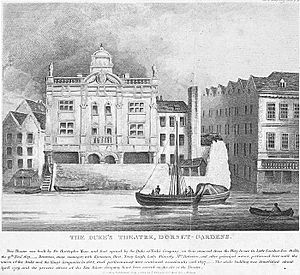Sir Thomas Skipwith, 2nd Baronet facts for kids
Sir Thomas Skipwith, 2nd Baronet (born around 1652 – died 15 June 1710) was an important person in London during the late 1600s and early 1700s. He was a Member of Parliament (MP), which means he helped make laws for the country. He was also a manager of theaters.
Early Life and Family
Sir Thomas Skipwith was the son of Sir Thomas Skipwith, 1st Baronet. His mother was Elizabeth Lathom.
He married Margaret, who was the daughter of George Brydges, 6th Baron Chandos. Before his marriage, he studied law at a place called Gray's Inn in 1670.
A Career in Politics and Theatre
Sir Thomas Skipwith had a short time in the military. After that, he was chosen to be a Member of Parliament for Malmesbury in 1696. This was an important role in the government.
He also became very involved in the world of London theaters. In 1682, he bought a share in the Duke's Company, which was a famous theater group. Later, he worked with Christopher Rich to manage the Theatre Royal, Drury Lane. This was one of the most important theaters in London.
During the time Skipwith managed the theater, plays started to change. They began to show more fun and lighthearted shows instead of serious dramas. Some actors, like Thomas Betterton, were not happy about this. They even complained to the Lord Chamberlain, who was a high-ranking official.
A Look at His Personality
A writer named Delarivier Manley wrote about Sir Thomas Skipwith in her book, Adventures of Rivella, in 1714. She created a character named 'Sir Peter Vainlove' who was based on him.
She described him as someone who liked to be admired. He was known for being very charming and witty. He also had a kind nature.
Sir Thomas Skipwith was known to live separately from his wife at times. In 1707, Isabella Wentworth, who worked for Queen Anne, wrote about him. She mentioned that he had returned to live with his wife.
When Sir Thomas Skipwith passed away, he left money to his housekeeper, Susanna Gurney. He also left money to her daughter, Charlotte.
 | Sharif Bey |
 | Hale Woodruff |
 | Richmond Barthé |
 | Purvis Young |


